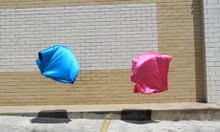In 2007, Julian Gough wrote in Prospect magazine that "the task of the novelist is … not to fake a coherence that does not exist, but to capture the chaos that does. And in so doing, perhaps we shall discover that chaos and permanence are not, in fact, opposed. The novel – self-renewing, self-destroying, always the same, always new, always … novel – is the art of permanent chaos."
The plot and theme of Jude in London, the first book on the 2011 Not the Booker shortlist, gives a fairly good insight into "permanent chaos". Its hero, Jude, has a face that has been altered by plastic surgeons so that it looks like Leonardo DiCaprio's in all regards – except that Jude has a functioning cock in place of a nose. We first meet him on the Irish Sea. He is swimming towards England and Angela, a woman whom he thinks he loves but who is forever telling him to "fuck off". Angela traps him inside a floating grand piano. He gets to England anyway. He meets (in the first of several very good set pieces relating to our recent economic woes) some former Irish property speculators. They have had to become labourers following the collapse of the Celtic Tiger, and are now failing to build a simple brick wall because they are so busy speculating on its future potential. Then, after chasing a monkey on a bicycle, Jude ends up in a kind of Hadron Collider, and accidentally changes the shape of the universe. Then he walks to London in the snow along the central reservation of a motorway, making himself a suit of dead rabbit pelts as he goes. Then he ends up in a porn film. Then …
… You get the idea. Or the great cacophonous jumble of ideas. There's a lot going on here – so much that I worry it's impossible to do the book real justice after one reading. For the purposes of this Not the Booker review, I've had one week to look at Jude in London; to disentangle it properly would take months. I'm pretty sure I got all the nob gags. I know I'll never look at Martin Amis the same way again thanks to a memorable riff that ended with the line: "with my kingsley amis tall, ruddy, at a drunken angle and my martin amis small and wrinkled and smoking." But I'm also sure I was missing things elsewhere. References to Wittgenstein slip by as quickly as daft jokes about the "Doe, a deer, a female deer" song – which itself may, worryingly, contain another joke about Schrödinger's cat … There are jokes within jokes, within philosophical ideas, within nob gags. It's impossible to catch them all.
Mostly such superfluity is exhilarating, especially since Gough has enough charm and wit to make you want to follow him, even though you have no idea where he may be going. Sometimes, however, it's hard to get through all the tangles. In that state-of-the-novel essay from Prospect, Gough complains: "As they became professional, writers began to write about writers. As they became academicised, writers began to write about writing." But what is Jude in London about, mainly? Writing and writers. It's a novel about what novels should be about and subsequently contains great long passages about what novels shouldn't be about, about novelists who are doing it wrong, and about the art of writing.
That shouldn't necessarily be taken as a fault. The ever-tricksy Gough is almost certainly aware that there's an issue here. He isn't afraid, for instance, to make sly jokes about James Joyce writing "incisive analysis of Ireland's paralysis from the traditional thousand miles away", when he himself has just given us that self-same analysis and the biography at the back of his own book states that he lives in Berlin. Such apparent hypocrisy just adds another layer of doubt and uncertainty to a novel deliberately structured like a tower of spinning plates – and whose built-in instability is the very thing that makes it eye-catching.
Some of the sections on writing are also spot-on. We are told, for instance, that modern Irish novelists most often write about "men at dusk, looking backwards; and women at funerals, in the rain". Hard to argue with that.
But then again, all of this novel-gazing can become tedious. Jude's madcap adventures grind to an awkward halt whenever the heavily capitalised subject of Literature comes up. I must also confess to slight squeamishness here. Is an Irish novel the most appropriate place to conduct a one-sided slanging match concerning the state of the Irish novel? Are we to assume from it that the author thinks Jude in London is a better book than those he disparages? Are the digs at "Colm Tobléróne" and "Anne Onnymuss" merited? I wasn't sure.
I also wasn't sure what I felt after reading Jude in London. It's certainly a good book. Yet, while it does contain a great many things that, say, Colm Tóibín doesn't, it also lacks one vital ingredient that Tóibín gives us in spades: dramatic and emotional involvement. I liked Jude, but I didn't believe in his adventures. They were too absurd. At its best, Gough's novel is dazzling. (Look at this extract about goats and financial bubbles to see just how sharp Gough's satire can be.) Even at its worst it's interesting and amusing. But there was little compelling me towards the end. Getting there became exhausting. "The closing of a book is a massacre," Jude tells us, as he reflects, with characteristic wit, upon losing the company of Don Quixote's Sancho Panza.
It's also, sometimes, a relief.




Comments (…)
Sign in or create your Guardian account to join the discussion